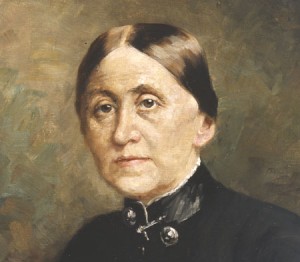Born in 1828 in Germany, Johanna Mestorf taught herself to become an archaeologist. After serving as a governess in Sweden at the age of 21‚ where she studied Scandinavian languages, she spent several years as a traveling companion, going to Italy and France on multiple occasions. Ultimately, she settled in Hamburg and became a secretary.
Johanna’s first impact on the study of archaeology began in 1863, when she translated Scandinavian works into German. These works introduced the ideas of typological study in artifacts (grouping things together by physical characteristics) and the Three-age system (Stone, Bronze, Iron), furthering the development of the field in Germany. She also studied ethnography, and wrote papers and lectured on ethnography, archaeology, and Norse mythology. She coined several terms, including “Single Grave culture” and “Bog body.” Because of Johanna, many archaeological sites in Schleswig-Holstein (the region her research focused on) were properly investigated and carefully preserved. She catalogued, documented, and preserved many finds, and educated the public on the importance of preservation.
Her work earned her an honorary post at the Kiel Museum, and when it merged into the Museum of Antiquities of the Fatherland, Johanna became the first custodian of the museum, and was made director in 1891. This made her the first female museum director in Germany.
Although she was repeatedly recognized for her scholarship in prehistory and ancient history, Johanna faced struggles as well. In 1884-85, she was denied permission to attend lectures at the University of Kiel by the professor. Despite this, many others respected Johanna and her work, and in 1880, the Ministry of Culture was convinced to use her expertise for an anthropological exhibition in Berlin. She was granted an honorary doctorate and professorship, was elected to honorary (or similar) membership in 19 learned societies, and was awarded medals for her scholarship. She was also given a personally signed photograph of Emperor Wilhelm II upon retirement, as there was no recognition possible for a woman.

